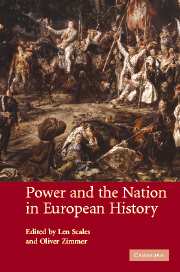Book contents
- Frontmatter
- Contents
- List of contributors
- Introduction
- PART I APPROACHES AND DEBATES
- PART II THE MIDDLE AGES
- 4 Germanic power structures: the early English experience
- 5 The historiography of the Anglo-Saxon ‘nation-state’
- 6 Exporting state and nation: being English in medieval Ireland
- 7 Late medieval Germany: an under-Stated nation?
- PART III ROUTES TO MODERNITY
- PART IV MODERNITY
- Index
6 - Exporting state and nation: being English in medieval Ireland
Published online by Cambridge University Press: 02 December 2009
- Frontmatter
- Contents
- List of contributors
- Introduction
- PART I APPROACHES AND DEBATES
- PART II THE MIDDLE AGES
- 4 Germanic power structures: the early English experience
- 5 The historiography of the Anglo-Saxon ‘nation-state’
- 6 Exporting state and nation: being English in medieval Ireland
- 7 Late medieval Germany: an under-Stated nation?
- PART III ROUTES TO MODERNITY
- PART IV MODERNITY
- Index
Summary
England was, by medieval standards, an unusually coherent and centralised kingdom, particularly between the late twelfth and fourteenth centuries, the period with which this chapter is concerned. It is not surprising, therefore, that the influence of the crown over the outer edges of the polity should be proportionately strong. This strength is visible in Ireland, to which English law and government were extended between the reigns of Henry II and Edward I. The extension was not of course effective across the entire island, but nor was it restricted to the area around Dublin: the Pale was a concept that appeared only in the early Tudor period. Over much of the east and south, military and political domination was accompanied, on the coasts and in the river valleys, by significant colonisation from Britain. This was the soil in which institutions – which from the time of King John were explicitly described as English – took root. By the middle of the fourteenth century, when the phase of confident expansion had ceased, the settler elites constantly stressed their loyalty to the crown and their Englishness. These qualities had become synonomous.
My subject is the inter-relationship between the extension of the English state and settler identity: between, in other words, ‘power’ and ‘nation’. I shall argue that the latter is comprehensible only if due weight is given to the former.
- Type
- Chapter
- Information
- Power and the Nation in European History , pp. 143 - 165Publisher: Cambridge University PressPrint publication year: 2005
- 3
- Cited by



